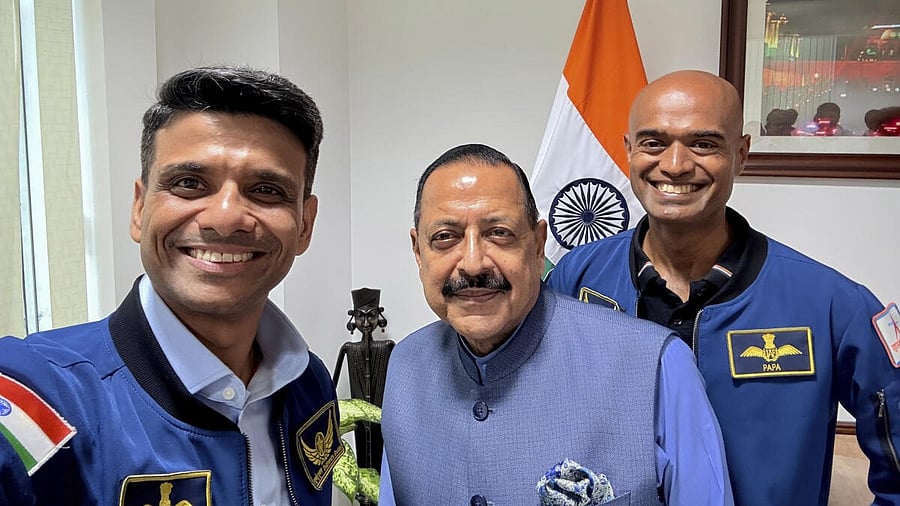
Group Captain Prashant Balakrishnan Nair (R)
Credit: PTI Photo
New Delhi: The four Indian astronauts chosen for the country's Gaganyaan mission reflected on the deeper meaning of human space flight on Saturday, linking it with ancient wisdom, humility, scientific pursuit, and a new generation's dreams of exploring beyond Earth.
Speaking during a session on the National Space Day, Group Captain Prashant Balakrishnan Nair said India's civilisational knowledge had long anticipated modern space science.
"We are an ancient civilisation. I always feel that we were so far ahead that we got bored, and let the rest of the world catch up. Now we are coming back again," he remarked, stressing how astronomy and astrology were once unified in India's Jyotish Shastra.
Drawing parallels with epics, he said even the Ramayana contained "the entire mission control" when Hanuman took a leap "like an astronaut" with support from his team.
On astronaut training, Nair said, "We train like athletes, we study like scientists and engineers, and we are taught to behave like diplomats." Group Captain Ajeet Krishnan underlined that space exploration must remain connected to life on Earth.
"For anything and everything that we do in space, it has to have some kind of usefulness on Earth," he said, cautioning against losing perspective. He also highlighted the importance of humility in human spaceflight.
"You have to be down to earth to be up in space," he said, noting that India still has much to learn from global experience.
Imagining his own "bucket list" of cosmic travel, he joked that he would first orbit Earth from every angle, then leap on the Moon to "break all high jump and long jump records" before attempting visits across the solar system.
Group Captain Angad Pratap said astronauts' roles extend far beyond piloting spacecraft. "Human spaceflight is also for the cause of scientific research. That is the main aim," he said, calling astronauts "pioneers" who lend their bodies for experimental study, from psychological research to building training protocols.
"Most of the work happens here on ground," he noted, adding that being an astronaut is "a way of life" shaped by patience and uncertainty, as one may wait years for a mission.
Group Captain Shubhanshu Shukla, who flew on the Axiom-4 mission to the International Space Station, said seeing Earth from orbit gave him a profound new perspective.
"You get to see the planet Earth from so many different angles. You really feel that you get to know this entire planet," he said, describing space as having a "transformational capability of transcending borders and unifying nature."
Reflecting on the four-decade gap since Rakesh Sharma's flight, he said, "Back then, it was a one-off event. Today, kids ask me quite seriously how to become astronauts. This time, it's a possibility."